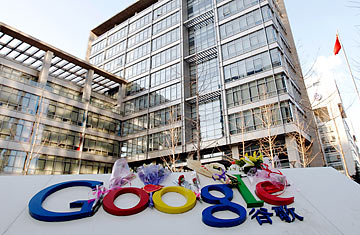
Google's headquarters in China
The furor surrounding Google's bombshell announcement that it was contemplating withdrawing from business in China has centered on long-simmering issues of privacy, government control, and censorship. Google, a company whose DNA dictates that it "do no harm," is particularly well-cast in the role of defender of western values of freedom of expression and open access to information against a Chinese system that brooks no political dissent and reserves the right to forcibly prevent certain types of information ranging from political expression to porn.
But there is another story here, more prosaic but no less important to the future arc of global business and the global balance of power. Google has not been doing all that well in China, as many have noted in recent days, badly trailing the domestic Chinese search company Baidu. But it isn't just that Google has struggled. All of the New Economy western companies in the media and information business have failed to establish themselves in China. Before Google, eBay and Yahoo both made investments of years and millions upon millions of dollars to tap the fast-growing Internet generation in China, and like Google, they could not gain traction. Both companies ended up pulling the plug on their China ventures, with eBay losing out to domestic Chinese auction company Taobao, and Yahoo ceding its operations for an ownership stake in Alibaba.com (which also controls Taobao).
The failure of these New Economy players in China is in stark contrast to the success of brick-and-mortar companies. Consumer stars like Nike, food franchises like Kentucky Fried Chicken, industrial giants like General Electric and United Technologies, and technology behemoths ranging from Microsoft to Intel to IBM have prospered in China. In fact, mainland China has been the most impressive growth market for hundreds of global companies for the past decade. So how did Google stumble so badly?
The rap on China's growth is that there's lots of building and selling but not much innovation. In many areas of the economy, that's true — and the same could have been said for the growth of the United States at the end of the 19th century. But in the areas of media and the Internet, it isn't. There, China has a thriving culture of thirtysomething entrepreneurs, many with U.S. work experience, who are creating home-grown franchises catering to the burgeoning world of the web in China. Baidu, the rival search engine to Google, is most in the news lately; others include web portal and entertainment companies Sina and Netease; on-line, multi-user gaming company Shanda (which recently made an acquisition of an American gaming company and plans to expand to the United States); internet and mobile applications giant Tencent; and a host of others, some public, some still in start-up mode.
These companies have a distinct advantage over foreign competitors because their founders and senior managers are part of the same elite class as the regulators who enforce the various and mostly unwritten rules of censorship. They have offices in Beijing, and they lobby the Chinese government through uncharted back channels and are in what amounts to a continuous dialogue about what is and what is not acceptable. This includes not only political censorship but morals — especially relating to porn and sex. Google may have hired its own cadre of Chinese executives but it — like Yahoo and eBay before — has always played catch-up to the more connected crowd of Chinese entrepreneurs and their companies.
Google and the Western media in general have effectively turned this imbroglio into a clash of morals. Perhaps. But it is also yet another symbol of the shifting balance of economic power globally. Other countries censor content, and not just rogue regimes such as the Iranian mullocracy. Web sites are blocked throughout the Persian Gulf and North Africa based on objectionable content and this hasn't created much of a furor. Other countries also engage in cyber espionage, especially Israel and of course the United States Government itself with the largest group of hackers in the world employed by the National Security Agency.
But China's efforts to censor and monitor the web represent a challenge to the uncontested hegemony of Western business and to the dominance of Silicon Valley in the world of new technologies. That story — of China's emergence and a burgeoning world of hungry entrepreneurs not willing to play second fiddle to America — is the backstory for the Google imbroglio and one that is about to assume center stage.
Zachary Karabell is the author of "Superfusion: How China and America Became One Economy and Why the World's Prosperity Depends On it" (Simon & Schuster 2009) and president of River Twice Research (www.rivertwice.com)
